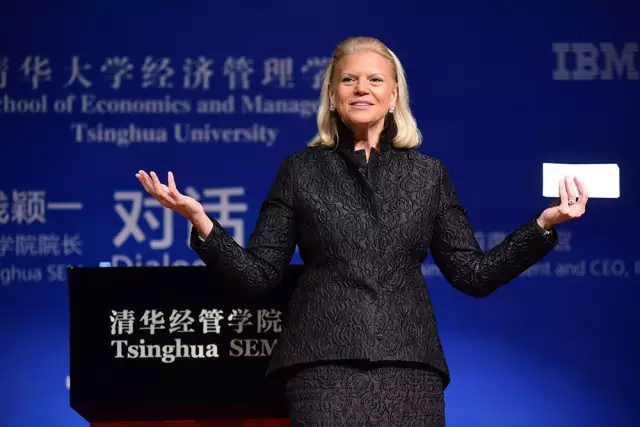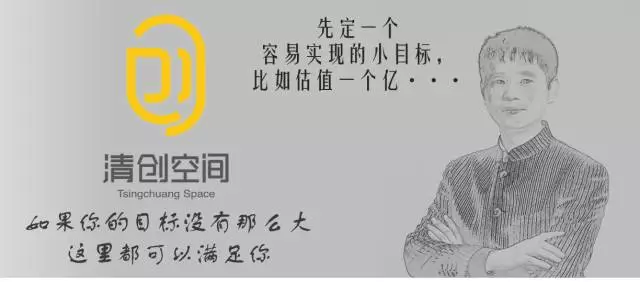
清华经管学院顾问委员会委员、IBM公司董事长、总裁及首席执行官罗睿兰(Ginni Rometty)在清华经管学院发表主题为“转型,奔向认知商务时代!”的演讲
今天来到这里,对于IBM以及我个人而言都是一个很棒的机会。首先我想说我非常自豪能够成为清华经管学院顾问团的成员,所以跟你们有着一份特殊的缘分,而且有数百位清华大学的毕业生在我们IBM工作,这是我感到十分自豪骄傲的,感谢你们。或许我结束演讲之后,在座还会有好几位毕业以后也要加入IBM。
我一直以来都十分喜欢中国且大力支持我们公司在中国的发展,每年会来中国两到四次。就在前几周李克强总理访美期间,我也在纽约与李总理进行了会面,就“创新型社会”这个议题展开讨论。所以今晚,我想一开始给大家讲一讲我所认为的,由当前正在同步发生很多的技术变革、技术转型将给我们带来的机遇。
我想跟大家谈三件事:第一,我想谈论当前我们所处阶段中数字化转型;第二,我想介绍认知计算的时代,是我们正在经历发展的时代;第三个部分给大家介绍一下IBM和中国这一伟大国度的合作。
我先讲一下数字转型。
一个公司怎样去数字化?我在世界各地,包括今天在中国拜访了很多公司领导人,我问他们,你们谁想要做一个数字化的公司,或者已经是数字化的公司了?他们无不举手。实际上IBM也是以这种方式在改造自己,我们在云端,在大数据,在移动等方面开发了很多新的能力。但是我真正想说的是,打造数字基础这一理念会不断地改变,而且不断会有新的创新,比如区块链。好比当年互联网改变信息和沟通一样,我想区块链技术绝对有机会,也有条件可以彻底颠覆和改变今天的交易模式,这是一种基于信任的交易模式。我经常告诉自己,也告诉我们的客户,当所有人、所有公司都已经数字化转型之后,公司还有什么怎样的差异化优势。当我们把数字商业加上数字智能,得出的就是认知商业,一个认知的时代。我之所以称之为认知时代是因为我认为这个趋势会在往后数十年的时间里不断的深入发展,在业务模式和技术模式两个方面引领整个认知时代。那么,在我深入讲解什么是认知之前,让我们先看看当前面临的问题,并且在数年时间内,我们是如何解决它的。大家天天都听到“大数据”这样的词,实际上世界上90%的数据是在最近两年才生成的。也就是说当前所存在的90%的信息都是最近两年才有的。但是其中八成的数据是所谓非结构化的数据,意思是视频、图象、图片、推文、感应器得来的信息,这样的信息电脑可以存储,但电脑不能理解,电脑并不了解其内容,直到现在。现在有了认知计算,认知系统不依赖编程,它能自我学习和理解这样的非结构化的信息,这个技术会改变你的生活,也会解决世界上最具挑战的难题。
那么认知计算系统,我刚才也说了,不需要编程,它会去看所有的数据、图片、声音、观察,然后开始捕捉、消化、学习,就像人脑一样。比如一个人问你一个问题,你的大脑会生成一个假说,去检索你所知道相关的数据,并在有把握的情况下做出回答;当然了,有时没有把握我们也会回答问题,其实认知系统也一样。有些人会称之为人工智能,但这个绝对不仅仅是人工智能,我们的展望也并非如此。为什么?这里有一个很重要的原因,认知不止于人工智能,目前的认知系统同时还有50多个不同的引擎在运作处理,你可以用自然语言和数据来进行互动,你可以用语音,用正常说话的方式和这些数据产生互动,而且你可以培训这个系统了解医疗、卫生、金融、教育、甚至时尚等领域。同时,它可以涉足所谓的灰色地带,也就是提供基于概率论、没有绝对正误的答案,这将非常有帮助。认知系统不是取代人的,而是增强人的智能。这是我们凭借Watson,对未来进行的展望。Watson是以IBM公司创始人命名的,我们花了几十年的时间进行开发,并让它在五年前一档名为Jeopardy的智力抢答游戏节目中首次亮相。在那之后,我们便开始致力于培训Watson去了解肿瘤学和癌症。同时,我们在45个国家用8种语言培训它了解了40个不同的行业,旨在帮助人们作出更好的决策。
我们不能将之与人工智能完全剥离开来,但Watson针对的是不同的目标。它是一种增强的智能,帮助我们回答和解决难题。我来给大家举一些例子。大家可能听说过美国有一个Macy’s零售商百货公司。作为购物者的你,将手握带有Watson的设备,使其帮助你找到个性化的商品。还有,芝麻街的学习节目,Watson学习了芝麻街,给孩子优化学习进程和偏好。还有我们跟一家食品公司合作,你可以告诉这些系统你想要一杯能使你感到开心、幸福的鸡汤;因为Watson了解哪些化学品,哪些大分子,让人能产生有开心愉悦的感觉,可以帮你做汤的配方,给你带来幸福感。实际上同样的道理,也可以应用于银行风险管理或医疗领域这些最深刻、最有难度的问题。举例来讲,你们可能听过Medtronic,这家公司专门攻克治疗慢病之一的糖尿病,它可以从海量的数据当中进行总结,然后可以提前三个小时预测糖尿病患者低血糖事件。还有癌症方面,Watson只用了很短时间就阅读了关于癌症和肿瘤学的2500万页的文献,并由来自美国5个顶级医院的20余名医生对Watson进行培训,其中包括有纪念斯隆凯特琳癌症诊疗中心,MD安德森癌症中心,美国梅奥医院以及美国克利夫兰诊所。现在的Watson可以阅读一个病人几百页的病例,通过观察你的X光片,对诊断和疗程做出优先排序。然后像同行一样跟医生互动,跟医生讨论,告知他/她应该额外做哪些检测,有哪些可能的解决办法。因为在当前世界,医生很难跟得上医学的文献资料。任何领域都是如此,信息是爆炸式的增长,这是一个认知的时代。
所以说这样的技术,实际上将会改变所有的一切,而且我自己也做了预测,在今后的五年中,每个重要的决策都是由像Watson这样角色加以帮助的。
最后我要总结一下,谈谈IBM致力于中国发展做出的贡献和努力。非常巧合,IBM在中国有32年了,而清华经管学院也同样有32年的历史;而且我们IBM和清华大学也是同样的年龄,我们都有着105年的历史了;这段时期是我们所引以为荣的。我们两个机构的历史都是和这个国家交织在一起的,回顾过去,IBM将个人电脑行业带入中国,并且合作建立了一家合资公司,名为长城计算机公司;这一举措也把现代供应链系统引入到了中国。眼下,随着我们步入下一个时代,我们同样欣喜自豪的看到很多合作项目正在进行发展。其中之一名为“绿色地平线”,这是一项长久的项目,致力于预测空气中的污染物。实际来讲,我们的团队现在已经可以做提前72小时的污染物预报了,我们可以发现污染源,以便努力改善环境。
另外我也非常高兴的告诉大家,你们刚才看到有关肿瘤的治疗方案,我们现在计划与本地合作伙伴一起携手21家医院推出癌症诊疗和治疗的合作项目,帮助医生诊断治疗癌症。这是IBM在中国的合作,以后会有更多的合作机会,在认知的领域也会有更多的成就。我刚才也跟院长也说了,我们希望能够招聘更多的毕业于清华经管学院的学生,来壮大我们已有的团队。
英文演讲全文:
This is a wonderful opportunity for us and it’s a great opportunity for me. Let me start the evening off and I should first tell you that I’m a proud member of the Tsinghua SEM Advisory Board. So I have another connection with you as well and I have hundreds of alumni from this school that work for IBM. So we are very proud of that. Thank you for that.
I am personally a great fan of China and very committed to China. I’ve come to this country for 2-4 times a year for as long as I can remember. Just three weeks ago, when Premier LI Keqiang was in New York, I met with him there too. It was to talk about innovation-based society. I thought I would start this evening talk about what I considered to be the promise of this moment in time. Because, as all of you in school you know, we are in the middle of many technology shifts. But I do think they bring great promise.
And so I thought I’d do three things, I want to talk about digital transformation where are we right now. The second, I do want to introduce the cognitive era in front of us. And then, third, I’d like to just share with you a little brief summary of IBM’s partnership and relationship with this great country of China.
So my first is digital transformation.
What is to digitalize a company? If I asked how many of you want to be a digital company, everybody raises their hands. In fact, that’s been a lot of how IBM has reinvented itself. We have built capabilities around cloud, around big data, mobility. But really what I wanted to say is that this idea of a digital foundation it’s going to keep changing. And there’s new technologies, things like Blockchain and maybe, dean and I will talk a little bit about Blockchain during the Question & Answer. I think it’s another technology that absolutely has the chance to do for transactions, trusted transactions with the internet did for communications and information. So what I say to myself and all of my clients, when everyone’s digital, then what’s going to distinguish a company? Take the idea of digital businesses, add digital intelligence, and you’ll come up with what we call a cognitive business, the cognitive era. And I call it an era cause what I’m going to talk to you about, I think it will play itself out for multiple decades to come. The world, you hear and see it everywhere, is big data, big data, big data… In fact, 90% of the world’s data has been created in the last two years, so 90% of all information that ever existed was created in the last two years. However, 80% of it is what the world calls unstructured, meaning it’s video, it’s image, it’s pictures, it’s tweets, it’s sensors, it’s things that computers can store but they don’t really know what they are, until now. Now, cognitive, the systems that you do not program, they learn, they can understand that kind of information and it is going to change your life and it will solve some of the world’s most difficult problems.
So, cognitive is this idea of a system that, as I said, you do not program it. It looks at data, all kinds, image, insight, sound, and it starts to understand, reason and learn, like your brain does. If someone asks you a question, your brain automatically forms a hypothesis, thinks about all the data you know to support the answer. And if you are confident, you speak. Well, sometimes, you speak even if you are not confident. And, then, you can line up all the evidences if someone asks you a question. That’s how these systems work. Now, some people call that artificial intelligence. There’s a really, really important reason this is not just artificial intelligence. That’s not the world we envision. Artificial intelligence is part of it, but there’s 50 more different engines that look at this data. Also, you interact with this data in language, natural language. You speak, you can speak with it. As well, domain, you can train these systems to know healthcare, finance, insurance, education, fashion. And, these systems deal with what I call the grey area. When there are not exactly a right or wrong answer, they help you. And more important, instead of being artificial intelligence, this is about augmenting your intelligence. That’s the world we envisioned with the system called Watson. Watson was named after IBM’s founder. We worked on it for decades. It debuted to the world in a game show called Jeopardy where it had to, it had to come up with what was the question for that answer. That was five years ago and since that time, the first thing we do was to train Watson on oncology and cancer. And then, since then, we’ve gone on add many industries, 20 industries, 45 countries, 8 languages. And it’s all about helping you make better decisions.
This is why it’s cognitive, harder to say that aren’t artificial intelligence, but a way different purpose. It’s about augmenting intelligence and solving problems. So, as an example, you’ve heard of Macy’s, a department store. They’ve got Watson in the palm of your hand as a shopper, who knows you and as you walking through the store, helps you with what exactly fits your personality and what you are looking for. Or you may be heard of Sesame Street for children. Watson has now looked at every video for Sesame Street and can understand how a child learns and matches the video up to help the child learn better. Or a food & beverage company we are working with, tells it you would like chicken soup and you want soup that makes you feel happy. Watson knows all the chemical compounds that makes a brain more euphoric and helps you with what is the right soup recipe. To the other end of the spectrum, the work we are doing in banking risk and money laundering, or two of the most profound area of healthcare. So as an example, you may have heard of a company named Medtronic, they work on one of chronic disease, diabetes. And with the ability to learn from all this data, we’ve been able to predict a hypoglycemia event three hours in advance. That’s a medical breakthrough. I also mentioned cancer, what Watson has done is it reads every textbook on cancer, every journal, 25 million pages of articles. It is then being trained for the last 5 years by the best cancer doctors from 5 major institutes in the United States, the most elite cancer institutes, Memorial Sloan Kettering Cancer Center, MD Anderson, the Mayo Clinic, the Cleveland Clinic have all trained Watson. And what it’s able to do is to read a medical record, hundreds of pages, look at X-rays and then prioritize diagnosis and treatment and tell the doctor, interact with the doctor in a very collegial way, … what more tests should the doctor run and what might be the possible solutions. This is the world, it’s impossible for a doctor to keep up. It’s impossible. And that would be true for almost any field. So that era of cognitive.
So, this kind of technology will in fact change everything. And I’ve made my own prediction, in the next five years, every important decision will be aided by something like this, every important decision and even not so important decisions will be aided by this.
Let me wrap up with just I said, I make a couple comments, I started with my commitment to China and about IBM’s commitment to China. We’ve been here 32 years. We are both talking about this, the same amount of time Tsinghua SEM has existed. Actually, IBM and Tsinghua University are the same age. We are 105 years old. I’m very proud of this time. Our two histories are very intertwined in this country. And if you go back in time, it is IBM that brought the PC industry to China. We formed the joint venture here at the time, it was called China Great Wall Computer Company. And it was the world’s introduction to modern day supply chains. That happened here in China. And now comes this next generation that we are working on together. And so, I was very proud to see some of projects we are doing jointly with this country. They range from something called Green Horizon, it’s a tenure project with the country that has to do with being able to predict the pollutants in the air and in fact already, the team can do it 72 hours in advance so you can find the source of the pollutant and then you can try to improve that environment.
Or, on the other hand, I’m happy to tell you what you just saw there on cancer, we are now rolling out with a local partner in Hangzhou an initiative, in 21 Chinese hospitals, to help doctors there diagnose and treat cancer. So this is just another step in what I know would be a great future between IBM and China, and there’ll be many more things accomplished and I believe, in this cognitive era as we go forward, and I hope from the dean, many more students we will hire here to add to our thousands and thousands of what we have already.
转自:未来宏达EDP智库





